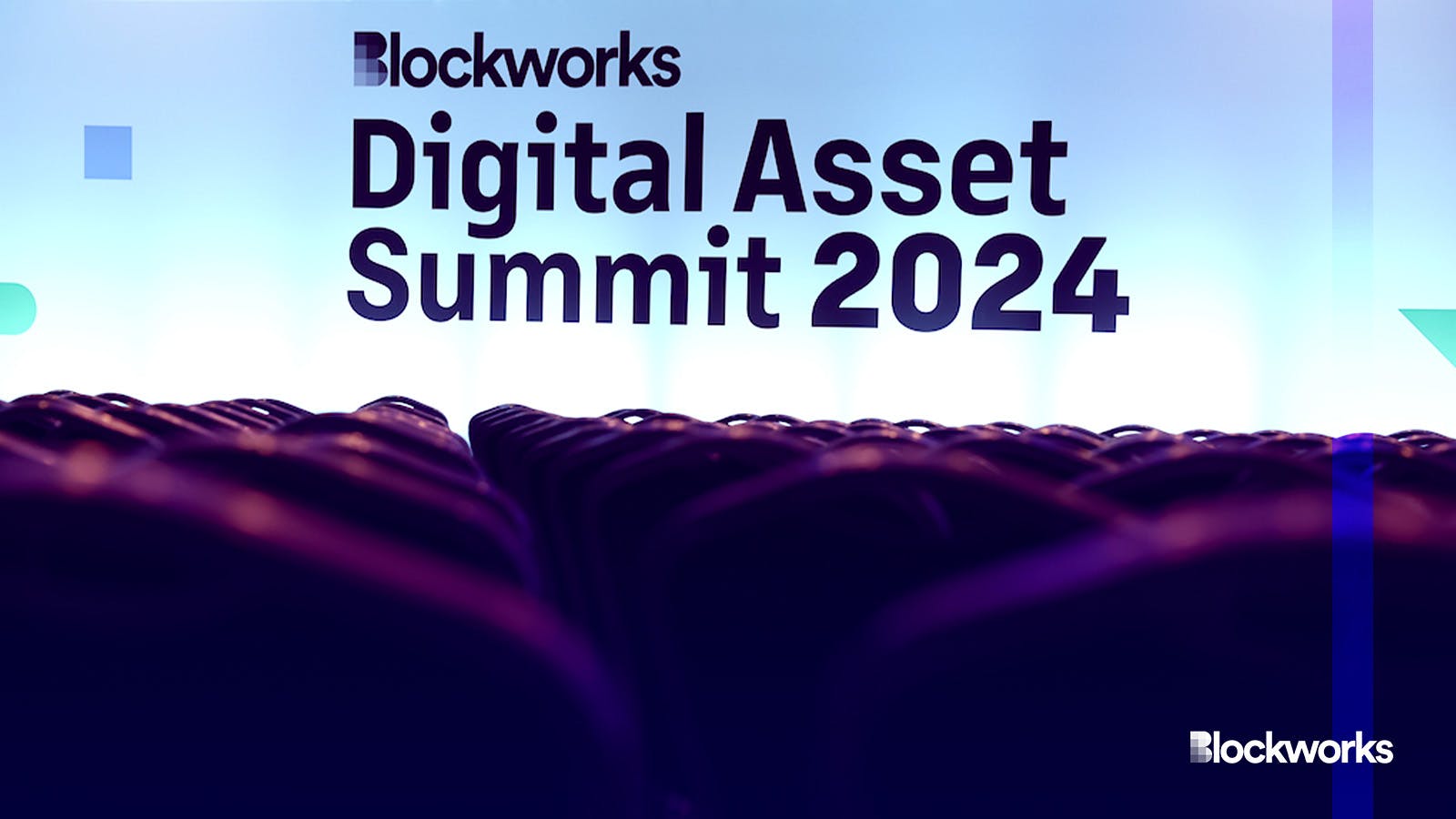Digital Asset Summit Day 1: Yield is a Trojan horse for technological revolution
The world’s premier institutional-grade conference has officially kicked off in London, and the vibes are high

DAS 2024 London modified by Blockworks
Digital Asset Summit (DAS) is back in London after a one-year hiatus, and its return couldn’t be more timely.
The rumbling buzz in the lobby leading into the first day of DAS matched the feel of the event’s Telegram group: energetic, hopeful and relieved to participate in a grown-up event on the other side of the pond.
Ages and genders in the crowds varied, and so did outfits — a bright yellow suit ensemble shot up like a sunflower in amongst beige, black and blue. One punter wore a backpack padded with neon panels that projected an animated Nouns NFT across the booth floor during lunch.
On the DAS stage, during a session after the Chatham House Rule had been lifted to allow press in the room, panelists nutted out the finer details of institutional participation in crypto staking.
Read more: Grayscale announces fund aimed at optimizing staking rewards
After all, the process essential to the security of practically half of all digital assets in one way or another — staking — is one that aligns perfectly with financial players going all the way back to medieval Italy and even ancient Mesopotamia. Give up free-flowing access to capital to receive even more money in the future. Call it interest, yield or staking rewards, the outcome is the same.
What’s clear is that if the blockchain space is to benefit the most from a new wave of institutional interest, then the technological utility of staking should form the bedrock for their interest, over purely economic gain.
Market participants generally agree there is some degree of institutional staking in Ethereum, but it’s difficult to quantify exactly how much.
Lido controls more than 30% of the Ethereum staking market. But much like the underlying blockchain, it is a neutral software with practically no barriers to entry and no clear ways to delineate the institutional-ness of its users: A hypothetical Wall Street bank and a regular individual look exactly the same in terms of the data.
Read more from our opinion section: DeFi needs institutions — and regulation
Pseudonymous Steakhouse Financial co-founder adcv, who works closely with the DAO behind Lido, spoke to this point on stage in front of a packed crowd, standing-room only: “Staking is not really a financial activity. Staking is a computer science process that helps secure a blockchain and ensure that it’s credibly neutral and secure and so forth, so staking is a way of expanding the rate at which these computer science operations can take place.”
“We talk a lot about the next generation of institutional staking, but in reality, in my view, there is no next generation, there is no current generation either. There’s just staking, period. And within that realm, how you decide to allocate your ETH to stake is very important to maintain some of these economic values which make Ethereum such an important settlement layer,” they said.
That kind of talk is refreshing, considering the persistent price obsession all around. Bitcoin, while now working through some reconsolidation, has hit multiple all-time highs in recent weeks, as ether has inched closer to its own ATH. Solana, arguably this cycle’s darling, is at peak market capitalization despite trading 20% below price record on account of supply inflation.
Solana is speedrunning the kinds of market mania synonymous with its cheap-chain predecessors like Binance Smart Chain, driving a sequence of memecoin pumps that could soon crescendo with a paid-for dogwifhat (WIF) appearance on the buzzy Las Vegas sphere.
Read more: A memecoin might get the Vegas treatment, but crypto ads rarely age well
For BlackRock’s Larry Fink to roleplay as a top bitcoin salesman on TV — a performance rivaling even voracious bull Michael Saylor — in amongst all that ruckus is more than a sign of the times. It’s proof that heady conversations that ran in tandem on Twitter and across hazy dorm rooms were really onto something.
BlackRock and Fidelity’s spot bitcoin ETFs may be the most recent examples of institutional participation in crypto markets, but some suits have long made themselves at home. Citadel Securities, Charles Schwab, Virtu and Sequoia, as well as the digital assets arm of the aforementioned Fidelity, have been running their own crypto exchange, EDX Markets, for nearly a year.
Franklin Templeton, an almost 80-year-old operation with about $1.5 trillion assets under management, uses a Polygon token to track ownership for one of its money market funds. Not to mention that a string of European banks have tokenized multiple bonds on Ethereum, the first coming nearly three years ago.
The staking panel rounded itself out holistically. It’s on the current industry crop to build robust tooling and infrastructure to serve crypto-curious institutions well. Much of the following panel, on the payments use-case for crypto, at times felt stuck in attempts to name which blockchain would end up dominating cross-border remittances.
So, the institutions have either just arrived, or they’ve been here for a while, depending on one’s vantage point.
On a sold-out day of DAS, though, the industry has clearly gathered to figure out exactly what it is, and where it stands, in real-time.
Get the news in your inbox. Explore Blockworks newsletters:
- The Breakdown: Decoding crypto and the markets. Daily.
- 0xResearch: Alpha in your inbox. Think like an analyst.






